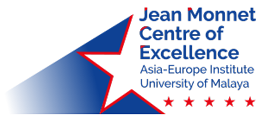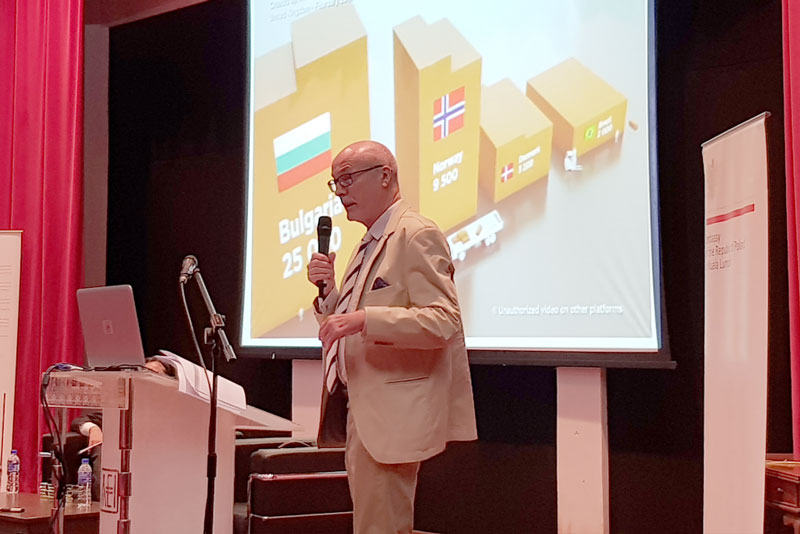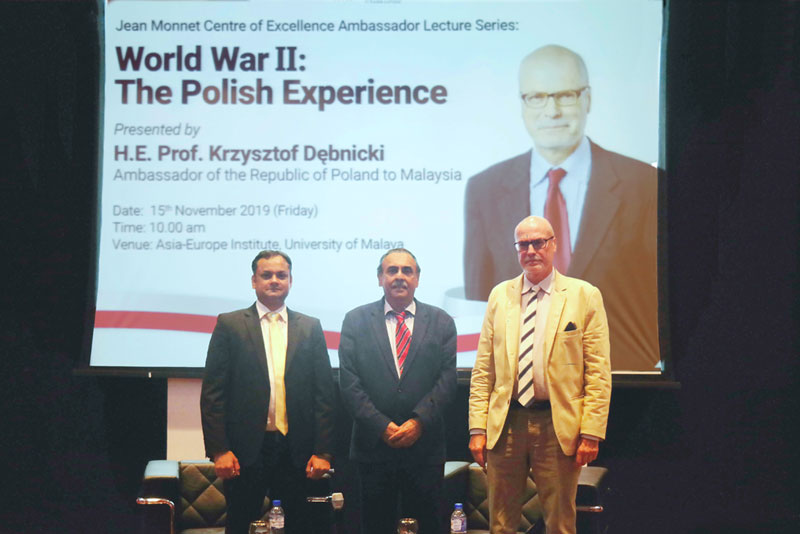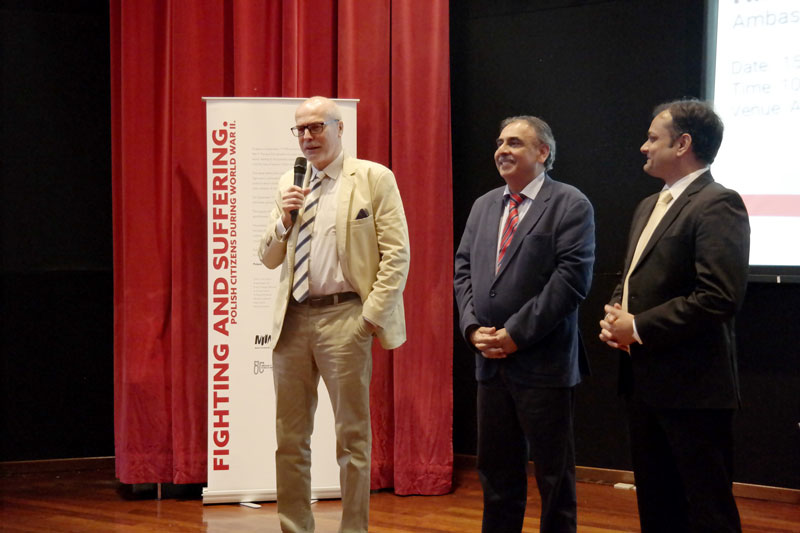
REPORT: JEAN MONNET AMBASSADOR LECTURE SERIES (ALES) 2019
Date: 15th November 2019 (Friday) • 10.00 am • Asia-Europe Institute, University of Malaya
 H.E. Professor Krzysztof Dębnicki, Ambassador of the Republic of Poland to Malaysia
H.E. Professor Krzysztof Dębnicki, Ambassador of the Republic of Poland to MalaysiaIn conjunction with a two-week exhibition on “Polish Citizens during WWII” jointly organised by the Embassy of the Republic of Poland to Malaysia and the Asia-Europe Institute, a lecture was presented by His Excellency Professor Krzysztof Dębnicki, the Ambassador of the Republic of Poland to Malaysia. This lecture and Q&A session was part of the Jean Monnet Centre of Excellence Ambassador Lecture Series (ALES). It was held at the AEI Auditorium on 15th November 2019 from 10 am to 12 pm. The event was attended by embassy representatives from various countries, government officials, academics, representatives from the media, representatives from NGOs and students.
Associate Professor Dr. Jatswan Singh, Acting Executive Director of the Asia-Europe Institute, addressed the audience with opening remarks to start the event. H.E. Professor Krzysztof Dębnicki then delivered a lecture entitled “World War II: The Polish Experience.” He began by expressing his gratitude to the organisers and acknowledging that the topic at hand might be considered as an unpleasant one due to the nature of its history. The introduction of the lecture walked the audience through the turbulent history of Poland and their fight for independence. First gaining independence in 1918, Poland entered the early stages of building a sovereign nation from the end of World War 1. This included the merging of three colonies, namely the Russian, Prussian, and Austrian, with each of their distinctly different languages, cultures, and infrastructures.
Poland had to fight some of its neighbours in order to fix and secure the physical borders of the country. Then, in 1939 began the invasion of the Germans and the Slovak Forces followed by the Soviet invasion on the 17th of September 1939. Although Poland’s Western allies, including the United Kingdom and France, had declared war alongside Poland, nothing came about from it. H.E. Professor Krzysztof Dębnicki highlighted through a visual depiction of the invasion efforts on a map of Poland that geography had been an important factor in its unfortunate involvement during World War II.
 H.E. Professor Krzysztof Dębnicki with moderator of the day, Dr. Rahul Mishra (left) and Assoc. Prof. Dr. Jatswan Singh (middle), Acting Director of Asia-Europe Institute, University of Malaya
H.E. Professor Krzysztof Dębnicki with moderator of the day, Dr. Rahul Mishra (left) and Assoc. Prof. Dr. Jatswan Singh (middle), Acting Director of Asia-Europe Institute, University of Malaya Although both countries were aggressive, Germany and the USSR carried out their actions in very different approaches, which aligned with their individual ideologies. Germany bolstered the superiority of the Germanic race through liquidating certain races and enslaving others, whereas the USSR acted as an ideological Marxist state where understandings of the past and present shaped predictions for its future. The Polish government then relocated to Romania, to France, then eventually to Great Britain until the end of the war in 1945. What was left of the Polish people were scattered across surrounding nations including fighting in armies alongside the UK, in North Africa, or Italy, as refugees in British-India. Others joined the communist movement in the Soviet Union, or volunteered to build armed force within Poland itself.
Under German occupation from 1939 to 1944, although there had been no physical fighting, Germany was highly efficient in implementing ethnic cleansing. Therefore, 85% of the Jewish population was killed. H.E. Professor Krzysztof Dębnicki proceeded to a video that highlighted the number of casualties in each country during World War II. All countries involved suffered extremely heavy losses throughout this period. It was heartbreaking as Poland had lost 5.6 million people, the largest quantity in the world in terms of percentage of the population. What had happened in Poland was genocide and the infrastructure and cultural heritage that once existed had either been mostly destroyed or stolen.
By the end of World War II in 1945, Poland had to begin again. With new territory provided by Germany, the country had physically shifted to the West and mass migration took place with the country and across borders from the Soviet Union. Unfortunately, Poland’s war was not over yet. Through H.E. Professor Krzysztof Dębnicki’s expertise on the history and politics of Central and South Asia, he compared the next 44 years of Poland’s history as being somewhat similar to the Princely States in India, where the important decisions fell within the hands of the supreme power, not the local rulers. In this case, they experienced “neo-colonial domination” by Moscow.
 H.E. Professor Krzysztof Dębnicki officiating the exhibition on “Polish Citizens during WWII“
H.E. Professor Krzysztof Dębnicki officiating the exhibition on “Polish Citizens during WWII“Only in 1989 did they finally enjoy the privileges of full sovereignty and independence. The ambassador attributed the victorious collapse of the communist government to the leaders of the Polish Freedom Movement, economic sanctions from the United States during the Reagan administration, and the strong support of the Polish people. The audience was entranced by the vivid historical account that the ambassador conveyed and was clearly moved by the sentiments of a citizen who is proud of his country now. Even throughout an uphill battle in Poland’s fights for democracy, H.E. Professor Krzysztof Dębnicki rightfully concluded that he was “happy to be the ambassador of a sovereign state.”
Following this, the moderator of the event, Dr. Rahul Mishra gave some commentary on the lecture. He presented his opinions from an international relations perspective on how Poland, like many smaller nations, become victims to the way major political powers have shaped and continue to shape world history. He emphasised the need for regional and multilateral forums to present the alternative views of smaller countries and become more egalitarian in the way decisions are being made. The voices of these smaller countries are essential in ensuring that they do not continue to fall into the meta-narrative of larger political powers, especially from the West. He then opened the floor to the audience. During the Q&A discussion, H.E. Professor Krzysztof Dębnicki focused on the contemporary Polish perspective on regional policy and their current world views.
In this public lecture, Dr. Rahul Mishra, Senior Lecturer at the AEI, was the moderator and Dr. Nurliana Kamaruddin was the master of ceremony.
Prepared by Charis Yeap Khai Leang.
Last Update: 15/12/2021